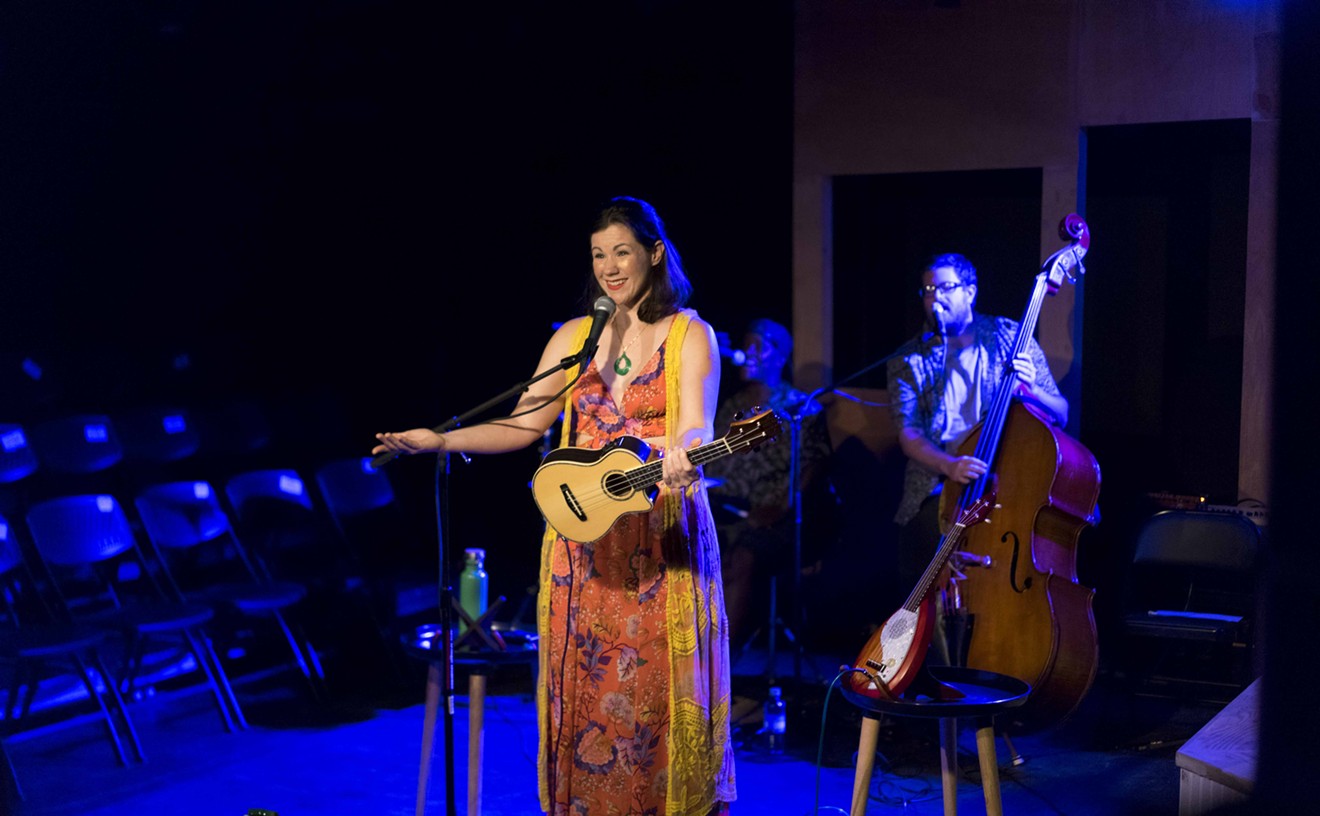Wait, where are you going? Come back, the review’s just started! But you hate audience participation? The whole forcing the viewers to take part in the show thing. Well, no one can blame you for that. Audience participation in theater mostly blows. But by the time Alli Villines and her back up band of two have the entire place (a pub backroom stage) gleefully singing about the worst, most final thing that can happen to a human being, it’s apparent that our involvement isn’t like those other cringe-worthy participation moments we’ve suffered through.
Which is ironic, because suffering is actually what the show is about. Written and originally performed in 2011 by hotshot experimental playwright Young Jean Lee, We’re Gonna Die explores the universal human feeling of pain that stems from loneliness, heartbreak, sickness, tragedy and death. More upliftingly, Lee’s show also gives voice to how we might comfort ourselves when faced with such inevitabilities.
But because this is a Young Jean Lee show, these themes and the way they’re presented are anything but inevitable. Lee, known for the multitude of non-traditional styles through which she tells her stories, here gives us her own magnetic version of a cabaret show. Well, part county/bluesy/jazzy cabaret, part comedy, part tear-jerker, part Moth Story Slam and part autobiography that steals willfully from others.
“All of the stories in this show are true, but not all of them happened to me,” says Villines, playing the storyteller/bandleader role Lee wrote and originated with the idea that after her, anyone should be able to play the part. Villines is
A story about a creepy uncle we’re certain is going to end with an even bigger creep factor, instead, has us handing out empathy cards for the poor odd soul. We’re shown that not all terrible breakups have to be without consideration and effort to be kind and that even when miracles happen; your life can still suck. That Villines can make the funny and the heartbreaking equally momentous is a testament to her softly peddled acting talent. There are no grand gestures here or big dramatic moments, instead, Villines woos us with her calm emotion and an ever-present crinkly-eyed smile that punctuates both her humor and her hurt.
As mesmerizing as Villines is with her story-telling however, it can’t help but be outdone by her musical turns (nicely accompanied by Gitiim Chakamoi on percussion and Alan Simmons on Double Bass). Lee offers up a fantastic mixed bag of songs that veer from the hysterical, When You Get Old, about how unglamorous the aging process is to the emotionally gutting, Comfort for the Lonely, which unflinchingly lays out the one thing those of us feeling lonely will never hear.
However, songs are just lyrics on a page and chords to follow unless there is a talent to set them alight and here is where Villines really shines, for she’s not simply the star of the show, she’s the musical director and arranger as well. An important role as there’s no particular musical style or arrangement dictated for We’re Gonna Die, so Villines is left to take this leeway and make the music her own.
In Lee’s original iteration, we got the Punk Rock treatment, and for those of us that saw or know about this version, it's hard to imagine any other show. There was just something about the delicate nature of the subject matter – loss, isolation, tribulation – juxtaposed to the discordant thrumming rage of punk that gave the show a kind of expressive gravitas. So what was Villines thinking when she decided to take the music in a more pop-country/bluesy direction with not one, but several ukuleles (an electric one included) as her main instrument?
If she was thinking, hell yes, this is gonna work, all we can say is damn straight. Villines’ version plays like an MTV unplugged twangy reimagining of Lee's original and yet loses none of the urgency. In fact, her arrangements at times make the melancholy even sadder and the funny even funnier. Yes, some of the heart-pounding energy isn't the same in places. I mean it's hard to beat punk for making you so energized you want to pierce your nose and throw things, but how can you beat the bizarre combo of uplifting ukulele and a song (Horrible Things) about how tragedy is coming round the mountain for you and everyone you know.
In some ways, by virtue of her sweet demeanor and musical choices, Villines has made Lee’s show even odder in the best kind of fashion. And that brings us to the aforementioned participatory final scene.
It’s not clear who came up with the idea to get us involved, might have been Villines or Director Jacey Little, who deserves kudos on for ensuring the seamless and perfectly natural flow of the production. Regardless, the exuberant fun of the final eponymous song – no spoilers here except to say no one needs to cower for fear of being embarrassed or singled out- is such a collective sigh of much needed tongue in cheek relief, that I bet if it were proposed as paid therapy, Horse Head could make a fortune peddling the experience.
As the audience loudly sings (and more) happily to, We’re Gonna Die, Lee’s final example of inevitability/comfort, we can’t help but be thankful that a show like this recognizes our need to share these feelings. Thankfulness goes to Horse Head as well for recognizing that We’re Gonna Die is a show we needed to see right now as a tonic to whatever pain we all are dealing with.
We’re Gonna Die continues through September 1 at various Houston venues. For information, visit horseheadtheatre.org. $15 - $45.


